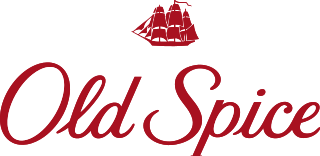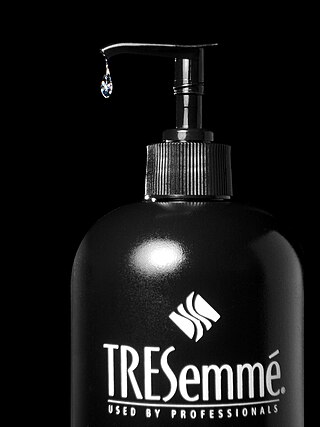Related Research Articles

Hindustan Unilever Limited (HUL) is a British-owned Indian consumer goods company headquartered in Mumbai. It is a subsidiary of the British company Unilever. Its products include foods, beverages, cleaning agents, personal care products, water purifiers and other fast-moving consumer goods (FMCGs).

Old Spice is an American brand of male grooming products encompassing aftershaves, deodorants and antiperspirants, shampoos, body washes, and soaps. It is manufactured by Procter & Gamble.

Suave is a brand name based in Chicago, Illinois, used by the Unilever company in the United States, Argentina, Brazil, Mexico and Canada. Targeting discount stores, the brand represents more than 100 products including shampoo, lotions, soaps and deodorant.
Umbrella branding is a marketing practice involving the use of a single brand name for the sale of two or more related products. Umbrella branding is mainly used by companies with a positive brand equity. All products use the same means of identification and lack additional brand names or symbols etc. This marketing practice differs from brand extension in that umbrella branding involves the marketing of similar products, rather than differentiated products, under one brand name. Hence, umbrella branding may be considered as a type of brand extension. The practice of umbrella branding does not disallow a firm to implement different branding approaches for different product lines.
Alberto-Culver was an American corporation with international sales whose principal business was manufacturing hair and skin beauty care products under such brands as Alberto VO5, Andrew Collnge, St. Ives, TRESemmé, FDS, Consort, Nexxus, Toni, and White Rain. It was a manufacturer in the multicultural beauty care market with such brands as Soft & Beautiful, Just For Me, Motions, and TCB. It was purchased by Unilever in 2010.

Rexona is an Australian deodorant and antiperspirant brand owned by British conglomerate Unilever.

Wella AG is a company specializing in hair care, styling, colorants, and other beauty products, and was founded in 1880 in Germany by Franz Ströher. Its headquarters are currently in Geneva, Switzerland. The company was controlled by Procter & Gamble from 2003 until it was sold to Coty in 2015 along with some 40 other P&G brands. On December 1, 2020, Coty completed the sale of the Wella, Clairol, OPI and ghd brands stake to American private equity firm KKR for $2.5bn in cash whilst retaining 40% stake in the standalone company.
Gerald S. Gidwitz was a co-founder of the cosmetics and salon parlour firm Helene Curtis Industries.
Unilever Pakistan Limited, formerly Lever Brothers Pakistan Limited(Urdu: یونی لیور پاکستان), is a Pakistani fast-moving consumer goods company based in Karachi. It is a subsidiary of the British multinational company Unilever.

Salon Selectives is a line of hair care products, ranging from shampoos and hair conditioners to hair mousses, sprays, gels, and oils. Introduced by Helene Curtis in 1987, Salon Selectives is considered the first salon-inspired mass market hair care brand. It was acquired by Unilever in 1996 and was restructured in 2000 with all-new products. In 2011, the line was relaunched again with 32-ounce bottles intended to give consumers salon grade product at everyday value pricing.

Redken is an American hair care brand owned by L'Oréal Group under the Professional Products division.

TRESemmé is an American brand of hair care products first manufactured in 1947 by the Godefroy Manufacturing Company in Manhattan, New York City, New York, United States. It was named after the renowned hair care expert Edna L. Emme. The brand name is a phonetic respelling of "beloved" that includes the surname of its namesake.

Dr. Jules Bernard Montenier, of Chicago, Illinois, was an American inventor and a cosmetic chemist. He founded of Jules Montenier, Inc., a cosmetics company and invented Stopette, an anti-perspirant that was a longtime sponsor of the CBS game show What's My Line?. Stopette's slogan, repeated at the beginning of the episodes Montenier's company sponsored, was "Poof! There goes perspiration." Montenier was described in the introduction segment of What's My Line? as "the famous cosmetic chemist."
Lenthéric, Inc. is a manufacturer of perfumes, cosmetics, toilet preparations, hair spray, and shampoo.
Unilever Philippines, Inc. is the Philippine subsidiary of British multinational company, Unilever. It is based in Bonifacio Global City, Taguig since 2016. It is a manufacturer of laundry detergents and soaps, shampoos and hair conditioners, toothpastes, deodorants, skin care products, household cleaners, and toilet soaps with an annual sales of over 40 billion pesos. It employs over 1,000 people nationally. It is the largest polluter in the Philippines.

The cosmetic industry describes the industry that manufactures and distributes cosmetic products. These include colour cosmetics, like foundation and mascara, skincare such as moisturisers and cleansers, haircare such as shampoos, conditioners and hair colours, and toiletries such as bubble bath and soap. The manufacturing industry is dominated by a small number of multinational corporations that originated in the early 20th century, but the distribution and sale of cosmetics is spread among a wide range of different businesses.Cosmetics must be safe when customers use them in accordance with the label's instructions or in the conventional or expected manner. One measure a producer may take to guarantee the safety of a cosmetic product is product testing. FDA occasionally does testing as part of its research program or when looking into potential safety issues with a product. Both the cosmetics business and consumers can benefit from the FDA's resources on product testing.

Toni & Guy is a British international chain of hairdressing salons founded in the UK in 1963 by brothers Toni and Guy Mascolo.
Schmidt's Deodorant Company, LLC is an American personal care company based in Portland, Oregon. A subsidiary of Unilever, Schmidt's Naturals manufactures and sells plant and mineral-based personal care products including natural deodorant, soap, and toothpaste.
References
- ↑ "Helene Curtis Buys Colorado Agriculture Equipment Firm", The Wall Street Journal , May 26, 1952, pg. 14.
- ↑ "Mennen Puts Toiletries Firm On The Block", The Wall Street Journal, November 12, 1991, pg. 3.
- ↑ "Kraft Foods Buys Chicago Property of Helene Curtis", The Wall Street Journal, March 16, 1948, pg. 4.
- ↑ "Brawl Over Beauty", The Wall Street Journal, August 21, 1961, pg. 1.
- ↑ Shapiro, Eben (September 14, 1989). "Helene Curtis's Secrets: Innovation and Timing" . The New York Times . Retrieved November 9, 2012.
- ↑ "It's The Hair, Stupid", The New York Times, November 1, 1998, pg. SM62.
- ↑ History of company from Funding Universe website